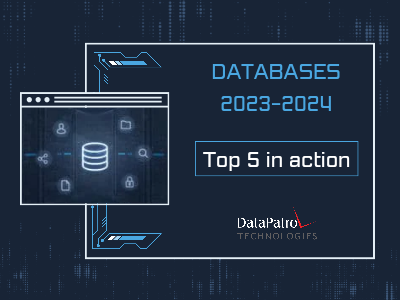- December 7, 2023
by Gauri Wahab - Sales & Marketing Officer
- Explore the critical role of databases in business operations
- Understand data centralization, information retrieval, and data integrity
- Learn about security, streamlined processes, scalability, and decision support
- Gain insights into top databases of 2023-2024: Oracle, MySQL, SQL Server, PostgreSQL, MongoDB
- Uncover unique features and advantages of these chart-toppers
- Leverage the power of databases for success in the digital era
- Ensure optimized, secure, and efficient data environments.

In the rapidly evolving landscape of modern business, the need for effective and efficient data management has become paramount. Databases play a pivotal role in the seamless functioning of business operations, acting as the backbone for storing, organizing, and retrieving critical information. This blog delves into the compelling reasons behind the indispensable need for databases in business operations and elucidates the pivotal role they play.
- Data Centralization: In any business, data is scattered across various departments and functions. Databases provide a centralized repository for storing diverse types of data, ranging from customer information to financial transactions. This centralization ensures that all relevant information is readily accessible and facilitates streamlined decision-making processes.
- Information Retrieval: The ability to quickly retrieve accurate and up-to-date information is crucial for business operations. Databases employ sophisticated querying mechanisms that enable users to extract specific data efficiently. This not only enhances decision-making but also boosts overall operational efficiency.
- Data Integrity and Security: Maintaining the integrity and security of business data is a non-negotiable aspect. Databases employ robust security measures to safeguard sensitive information from unauthorized access or tampering. With features like access controls, encryption, and audit trails, databases ensure that data remains accurate, consistent, and secure.
- Streamlining Business Processes: Efficient business operations rely on streamlined processes. Databases facilitate the integration of various business applications, allowing for seamless data flow between different departments. This integration eliminates data silos and enhances the overall coherence of business processes.
- Scalability and Performance: As businesses grow, so does the volume of data they generate and manage. Databases are designed to scale seamlessly, accommodating increased data loads without compromising performance. This scalability ensures that business operations can scale alongside organizational growth.
- Decision Support: Informed decision-making is the bedrock of successful business operations. Databases provide a structured environment for data analysis and reporting, empowering decision-makers with insights derived from historical and real-time data. This data-driven approach enhances strategic planning and fosters a proactive business environment.
Leading the Way: Top 5 Databases to Watch in 2023-24
Source: DB-Engines
Upsides of Chart-Toppers:
- Scalability: Oracle is renowned for its scalability, making it suitable for handling large datasets and growing business needs.
- Security Features: Oracle offers robust security features, including encryption, access controls, and auditing, ensuring data integrity.
- High Performance: Known for its high-performance capabilities, Oracle databases deliver efficient query processing and transaction management.
- Comprehensive Support: Oracle provides comprehensive support services, including documentation, forums, and customer service, ensuring users have resources for problem resolution.
- Open Source: MySQL is open-source, making it cost-effective and accessible to a wide range of users.
- Ease of Use: Known for its simplicity, MySQL is user-friendly and easy to set up, making it ideal for smaller projects and applications.
- Community Support: The MySQL community is active and offers extensive support through forums, documentation, and online resources.
- Cross-Platform Compatibility: MySQL is compatible with various platforms, providing flexibility in deployment.
- Integration with Microsoft Ecosystem: SQL Server seamlessly integrates with other Microsoft products, facilitating a cohesive ecosystem for Windows environments.
- Business Intelligence: SQL Server offers robust business intelligence tools, including reporting services and analysis services, enhancing data analysis capabilities.
- Scalability: SQL Server scales effectively, catering to the needs of both small businesses and large enterprises.
- User-Friendly Interface: Known for its intuitive interface, SQL Server is user-friendly and suitable for users with varying levels of expertise.
- Advanced Features: PostgreSQL offers advanced features, including support for complex data types, indexing, and extensive SQL support.
- Extensibility: PostgreSQL is highly extensible, allowing users to define custom data types, operators, and functions.
- Community Support: With an active and vibrant community, PostgreSQL users benefit from a wealth of knowledge and support.
- Scalability: PostgreSQL's architecture supports scalability, making it suitable for handling growing datasets and applications.
- NoSQL Flexibility: MongoDB is a NoSQL database, that provides flexibility in handling unstructured and semi-structured data.
- Scalability: MongoDB's architecture allows for horizontal scaling, accommodating large amounts of data and high-traffic applications.
- Document-Oriented: As a document-oriented database, MongoDB simplifies data representation, making it efficient for certain types of applications.
- Agile Development: MongoDB's schema-less design supports agile development, allowing for easy modification and adaptation to evolving application requirements.
Conclusion:
The need for databases in business operations is indispensable. They serve as the linchpin for data management, offering a structured and secure environment that underpins efficient business processes. As businesses continue to navigate the complexities of the digital era, leveraging the power of databases becomes not just a necessity but a strategic imperative for sustained success.
For cutting-edge database solutions tailored to your business needs, explore the comprehensive services offered by DataPatrol Technologies. Our 24x7 remote database and infrastructure management services, including DB monitoring, performance management, and cloud migration, ensure that your data environment remains optimized and secure. Partner with DataPatrol Technologies and elevate your database operations to new heights in the ever-evolving business landscape.
Contact us today to discuss how DataPatrol Technologies can enhance your database and infrastructure management. Reach out to us at +91 8484 8398 96 or mail to: info@datapatroltech.com for inquiries.
Trust DataPatrol Technologies to be your reliable partner in achieving excellence in database operations.


